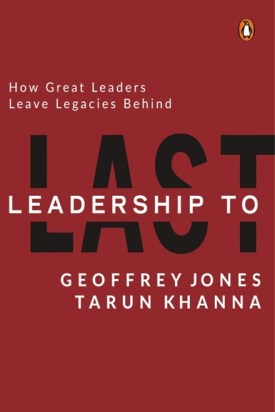There are lots of business leaders who make a mark that goes beyond profits. Profits are evidently rewarded by the stock markets. But some of them have made a difference with their work that is outside these contours and can be towards inclusion or promoting gender equality or education. We need to hear more of such stories.
In the book Leadership to Last, Tarun Khanna and Geoffrey Jones take us through several interviews with these leaders. It is not restricted to only businessmen and businesswomen but also other leaders in the social field. These interviews are clubbed under different heads like managing families, preserving values, contesting corruption, gender stereotypes, etc. The leaders chosen are from the Indian subcontinent and countries in Latin America and east Asia. Hence, there is a kind of homogeneity across them. Western countries have been left out, as the socio-economic structures are quite different and cannot be compared with those of the emerging markets. Besides, the activity of big business outside the perimeter of profit, especially in the area of philanthropy, is well documented and known.
These interviews have been conducted over the years, and hence could have a drawback in terms of their relevance today. For example, interviews with Adi Godrej and Rahul Bajaj were in 2013 and 2014, respectively, and relate more to managing family business. Things have changed in this period and hence could have been updated, though these snippets would still have theoretical significance.
The stories that will surely inspire are those with leaders like Shabana Azmi and Ela Bhat which pertain to gender stereotypes. One gets to see how difficult it is for women to rise in the echelons of our society. But it can be done and requires perseverance. There is a short one with Naina Lal Kidwai which can also inspire girls who are out to make a career, though admittedly things are very different today. Zia Mody takes us through what she does in her company to ensure that women do not drop out after maternity. This is something which all companies should try and follow because the way forward is to make sure they continue working with the same respect even after childbirth.
Mahindra Group has traditionally been the frontrunner in furthering education of girls which is also being done by other industry houses. But the crux really is that all these efforts are being done independently and hence impact is more at the micro level. Ideally, if there is collaboration, there could be a deeper impact.
Anil Jain’s story of Jain irrigation is again amazing. His company has been the frontrunner in drip irrigation. But it was not easy to sell the concept to farmers as there was too much of suspicion on their motives. There is always a feeling that any interference of corporates in farming must have an ulterior motive of finally taking over the land which is completely incorrect as almost all such measures are win-win situations. This gives us an idea that even if we want to bring about change in agriculture, there will be resistance. It also throws light on why farm laws have been opposed because no one wants to change.
The other interview which will touch you is the one with Devi Shetty. There is a lot of good that is going on in the country on the health front, with costs being brought down and people being encouraged to get themselves tested and operated for cardiac problems. The advances made in rural India have been amazing and Shetty’s story deserves an applause. The authors have also put the Tata story on Nano as one which brings in inclusion, though one can debate whether this really worked. While the car was on the roads, the price was not sustainable and hence a car for the common man is still a tall dream. But the effort surely should be commended.

On this theme, Anu Aga’s view that the onus is really on corporates to ensure that they do not indulge in corruption is significant because once when a company starts doing it for business as a ‘giver of bribes’, it just adds momentum to the system of corruption in the country. She calls for zero tolerance. But most companies may not follow this rule, as often paying bribes in the Indian system is defended as being speed money to ensure that work moves faster across various government windows.
This is quite a good book in terms of providing a rather detailed view on how various business leaders have moulded the compelling objective of profit with larger social goals and provided clues for other companies to follow. This is something that should be pursued with earnestness when dealing with their CSR plans, which tend to be more perfunctory rather than have any commitment. It will be interesting if the authors repeat this effort after another five years or so and do a reality check on whether there are more stories to tell. Given that there is a lot of emphasis on ESG these days and several leaders talking of giving, one can take an optimistic view going ahead.
Title: Leadership to Last: How Great Leaders Leave Legacies Behind
Authors: Tarun Khanna, Geoffrey Jones
Publisher: Penguin Random House
Pp 328, Rs 599

No comments:
Post a Comment